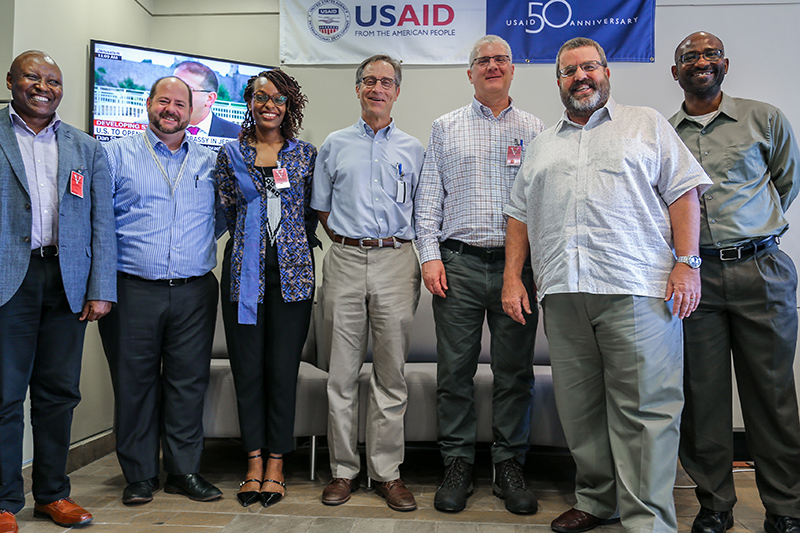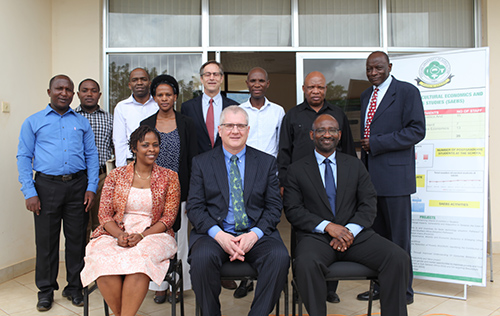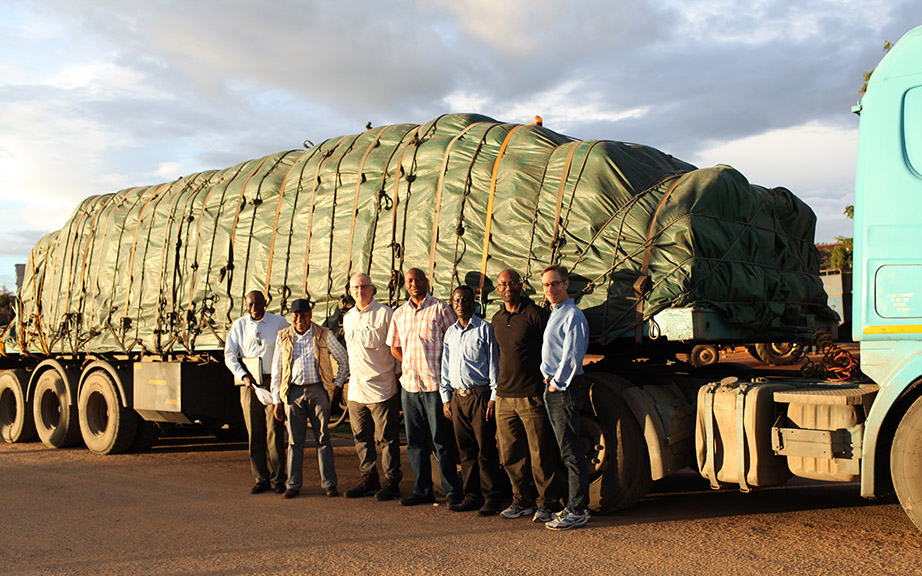MSU CANR Dean Ron Hendrick Visits Tanzania
In an effort to strengthen partnerships with local collaborators, Ron Hendrick, the Dean of the College of Agriculture and Natural Resources (CANR), made an official visit to Tanzania from May 13th to 18th, 2018.
The MSU Food Security Group (FSG) in Tanzania is working to accelerate the adoption of more effective policies and programs to drive broad-based agricultural sector growth, improve household food security and nutrition, and reduce poverty. This is being done through the USAID funded Agricultural Sector Policy and Institutional Reforms Strengthening (ASPIRES) Project, which is part of the activities of the Feed the Future Innovation Lab for Food Security Policy (FSP).

Photo, left to right: David Nyange, ASPIRES Chief of Party; Hal Carey, USAID Private Sector Lead; Elizabeth Mwambulukutu, ASPIRES Communications and M&E Specialist; David Tschirley, FSP C4b Principal Investigator; Ron Hendrick, Dean of MSU College of Agriculture and Natural Resources; Andy Karas, USAID Tanzania Mission Director; and Titus Awokuse, Chairperson, MSU Department of Agricultural, Food, and Resource Economics
In an effort to strengthen partnerships with local collaborators, Ron Hendrick, the Dean of the College of Agriculture and Natural Resources (CANR), made an official visit to Tanzania from May 13th to 18th, 2018. Accompanied by Titus Awokuse, Department Chairperson, Agricultural, Food, and Resource Economics (AFRE), and David Tschirley, FSP C4a principal investigator and co-Director of the Food Security Group (FSG), the MSU team was hosted by the ASPIRES in-country team under the leadership of David Nyange, ASPIRES Chief of Party.
During his visit, the Dean saw firsthand the implementation of ASPIRES/MSU’s work in Tanzania, the progress made to date, the existing challenges, and the next steps to be taken, including new areas of collaboration to accelerate the project’s implementation.
The Dean and team met with several key stakeholders including USAID Tanzania mission, the Policy Analysis Group (PAG) —ASPIRES’ key local partners in policy— and the collaborative policy research team at Sokoine University of Agriculture (SUA) which is the nation’s leading academic institution in agriculture. They were also exposed to policy outreach and advisory activities such as the establishment of the Market Intelligence Unit (MIU) at the Tanzania Ministry of Agriculture.

Photo: MSU-ASPIRES delegation in a group photo with SUA research collaborators studying land access dynamics and agrifood system transformation. Sitting: Ron Hendrick, Dean, CANR (centre); Titus Awokuse, AFRE Department Chair (right); Roselyne Alphonse, Researcher, SUA (left). Standing from left to right: Furaha Rashid, Scholarship Grantee under ASPIRES; Nickson Saverian, Scholarship Grantee under ASPIRES; Christopher Magomba, Researcher, SUA; Betty Waized, Researcher, SUA; David Tschirley, MSU AFRE Co-Director Food Security Group; Daniel Ndyetabula, Researcher, SUA; Ntengua Mdoe, Chairperson of the Land research Working Group; and Isaac Minde, Senior Policy Advisor, ASPIRES.
Andy Karas, the USAID Mission Director, commended ASPIRES and MSU for their high quality applied research and policy engagement. The SUA’s Vice Chancellor complimented ASPIRES for its ongoing work with various SUA faculty, addressing the policy evidence gap through collaborative policy research and capacity building. SUA’s faculty engaged in research with ASPIRES/MSU also expressed their own appreciation of the learning experience gained through the collaborative projects on agri-food systems transformation, “from farm to fork.”
Dean Hendrick was also able to see firsthand several of the agrifood system transformations taking place in the country. He visited the Dakawa Irrigation Scheme near Dodoma, the dynamic Kibaigwa market, and an edible oil processing plant. He met with stakeholders from the edible oil value chain who are responding to surging demand in the country and helping convert this sector into a big opportunity for local farmers producing sunflowers (more on the sunflower value chain in Tanzania). “Through great local leadership and strong partnerships, MSU through ASPIRES has been able to make real contributions,” said David Tschirley. Titus Awokuse added that these contributions “are not just to local understanding of how food systems are changing, but also to improve policy and programmatic decisions in the country, which help people. We think the Dean was able to appreciate this, while also seeing how Africa is becoming a very dynamic place where MSU can increasingly make important contributions that improve people’s lives.”

Photo: MSU delegation and ASPIRES team members at Kibaigwa Market, east Africa’s largest grain rural assembly market and is a key stakeholder to ASPIRES establishing the Ag. Market Intelligence Unit.



 Print
Print Email
Email




